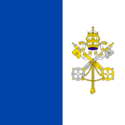Silvadum City
This article is incomplete because it is pending further input from participants, or it is a work-in-progress by one author. Please comment on this article's talk page to share your input, comments and questions. Note: To contribute to this article, you may need to seek help from the author(s) of this page. |
Silvadum City State | |
|---|---|
| Capital | Silvadum City (City-state) |
| Official languages | Latin[a] Medovian |
| Religion | Catholicism (Official religion) |
| Demonym(s) | Silvadian |
| Government | Unitary Christian absolute monarchy |
| Holy See | |
| Luke VII. | |
| Legislature | Pontifical Commission |
| Population | |
• 2018 estimate | 912 |
• 2014 census | 906 |
| Currency | Deru[b] |
| Time zone | UTC-2 |
| Date format | yyyy-mm-dd (AD) |
| Driving side | right |
| Calling code | +777 |
| ISO 3166 code | SD |
Silvadum City (Classical: /ˈs̠ɪɫ̪u̯äd̪ʊ̃ˑ/; Ecclesiastical: /ˈsilvɑːd̪um/), officially the Silvadum City State (Medovian: Erbes Śtot de Silvadi; Latin: Status Civitatis Silvadi) is a city-state governed by the Holy See in Gavarnik, the capital of Medovia. It is a official residence of the pope and de facto central point to the Catholic Church.
History
Before Christianity
The name Silvadum comes from old Latin settlement, named Silva Vadum, meaning "The Wooden Ford" in Common. Over centuries, the va in the first word merged with the second word, creating the term "Silvadum". The first record with the new name comes from the 4th century BC, noting, that in Silvadum, there was a flood.
Christian dominance
TBA
Late history
TBA
Papacy
TBA
List of popes
TBA
Biblical Canon
TBA

